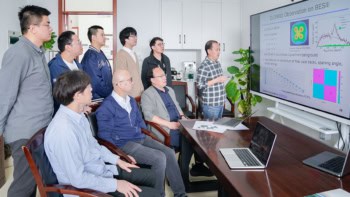Martin Weides is head of the quantum-circuits group at the University of Glasgow, UK, developing superconductor-based quantum circuits, including the cryogenic hardware, nanoelectronics chips and electronics needed for quantum computers. Weides is also consultant technical director to the UK-based firm Oxford Instruments Nanoscience

What skills do you use every day in your job?
Communication and management skills are really important. I also lead group meetings, mentor students, manage projects, exchange ideas with peers and develop research projects. Travel and meeting people in-person are an exciting part of the job too. There’s not been much of that since the pandemic started, but hopefully we’ll come back to this soon.
What do you like best and least about your job?
I love working in large, international, cross-border teams, developing new technologies, understanding problems and pushing boundaries to shape the future. Educating students and training the next generation of quantum scientists in the lab is also a great part of the job. I find it fascinating to see students evolving and growing as scientists, and to learn with and from them. As for the bad parts, administrative work is not my strongest suit, and probably on my list of pet hates, although I understand that housekeeping is vital if I’m to do the best possible research. What’s also been hard is the string of back-to-back online meetings. They leave little time for creativity, but hopefully things will get less stressful as time goes on.
What do you know today, that you wish you knew when you were starting out in your career?
Obviously with any career you don’t necessarily know where it’ll take you. So most of the time during my own career I didn’t know what opportunities were waiting around the corner – it would have been useful to know what was coming next! I have also realized that academic research is all about new approaches, methods or experiments – and that it’s okay to try and fail. That’s what humans are all about: we learn from our failures. It’s important in my area of applied physics to be free to do experiments that might go wrong because only then do we learn the art of trying and trying until we get things right. That’s what eventually brings you success.



